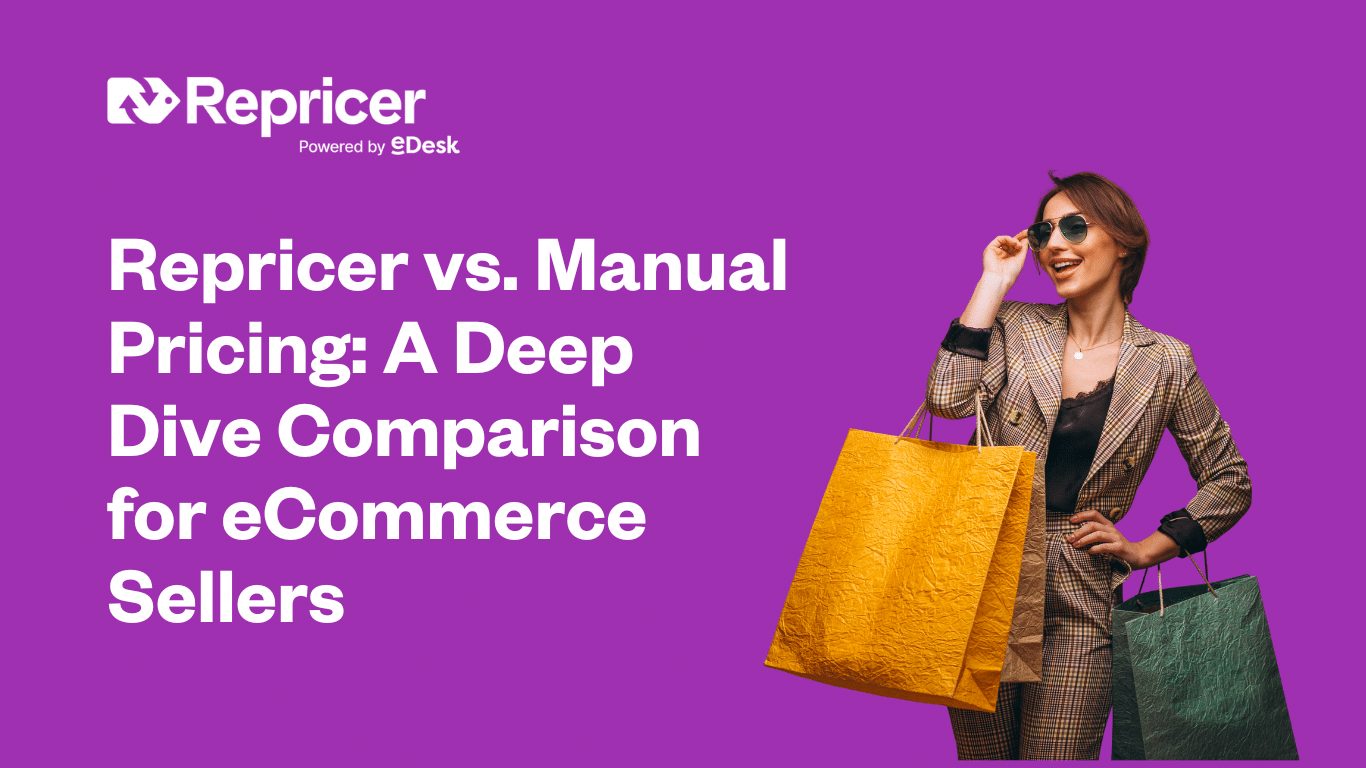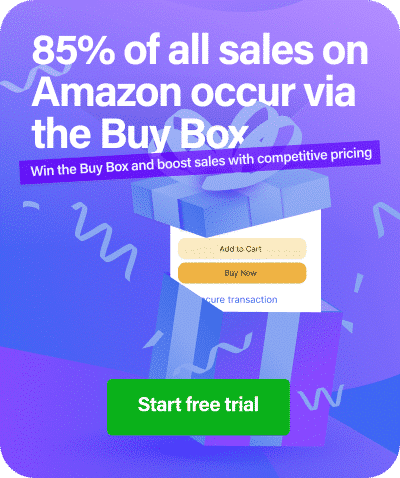Are you still manually updating prices in spreadsheets while your competitors adjust their pricing every few minutes? If you’re one of the many eCommerce sellers currently managing prices manually, you’re not alone—but you might be falling behind. With eCommerce sales projected to reach $6.86 trillion in 2025 and competition fiercer than ever, the way you price your products can make or break your business.
In this comprehensive comparison, we’ll explore the critical differences between repricer vs. manual pricing, examining how each approach affects your speed, accuracy, scalability, and bottom line. By the end, you’ll understand exactly why so many successful sellers are making the switch to automated repricing software.
The Current State of eCommerce Pricing
The eCommerce landscape has transformed dramatically. E-retail giants can change their prices every 3 minutes on average to optimize sales, while AI-powered pricing strategies continue to become more sophisticated, allowing eCommerce retailers to streamline their pricing processes and free up valuable time.
Meanwhile, 72% of successful eCommerce companies are already using automation in some parts of their workflows, and those implementing automation see impressive results: eCommerce businesses saw an 80% boost in lead generation and increased ROI by 45% by implementing eCommerce automation.
Manual Pricing: The Traditional Approach
How Manual Pricing Works
Manual pricing involves setting and adjusting prices without automated systems, relying entirely on human intervention. This typically means:
- Researching competitor prices individually
- Updating prices in spreadsheets or directly in your selling platform
- Making pricing decisions based on limited, often outdated data
- Reacting to market changes after they’ve already impacted your sales
The Hidden Costs of Manual Price Management
Time Investment: Manual pricing is incredibly time-intensive. Consider a seller with just 100 products across multiple marketplaces. Checking competitor prices for each product, analyzing the data and making pricing decisions can easily consume 15-20 hours per week. That’s time you could be spending on product sourcing, marketing, or business growth.
Human Error Factor: With manual processes, mistakes are inevitable. A misplaced decimal point, outdated competitor data, or forgetting to update a price can result in significant losses. These errors compound when you’re managing hundreds or thousands of SKUs.
Reaction Time Delays: By the time you notice a competitor has changed their price, research the optimal response, and implement your price change, you may have already lost sales. In fast-moving markets, this delay can be costly.
Automated Pricing vs Manual Repricing: The Technology Advantage
Before diving deeper into the comparison, it’s worth understanding the broader context of manual vs. automated repricing in today’s eCommerce landscape.
Speed: Minutes vs. Hours
The most obvious difference between repricer and manual pricing is speed. While manual price updates might take hours or days to complete, automated repricing software can:
- Monitor competitor prices 24/7
- Implement price changes within minutes
- React to market changes in real-time
- Handle thousands of products simultaneously
Real-World Impact: If a competitor drops their price by 10% on a popular product, an automated repricer can match or beat that price within minutes, while manual pricing might take hours or days to respond—if you even notice the change.
Pricing Accuracy at Scale
Manual pricing becomes increasingly error-prone as your inventory grows. Automated repricing software eliminates human error by:
- Using real-time data for pricing decisions
- Applying consistent pricing rules across all products
- Preventing pricing mistakes that could hurt profitability
- Maintaining pricing accuracy regardless of catalog size
Scalability: Growing Without Growing Pains
As your business expands, the scalability pricing strategy becomes crucial. Consider these scenarios:
Manual Pricing Limitations:
- 50 products = 10 hours/week
- 500 products = 40+ hours/week
- 5,000 products = Virtually impossible to manage manually
Automated Scaling:
- 50 products = Set up once, runs automatically
- 500 products = Same effort as 50 products
- 5,000 products = No additional time investment
The Benefits of Repricing Software
Data-Driven Decision Making
Modern repricing software doesn’t just change prices—it provides valuable insights:
- Competitive analysis and market trends
- Profit margin optimization
- Sales velocity data
- Performance analytics across different price points
Consistency in Pricing Strategy
Automated repricing ensures your pricing strategy is applied consistently across:
- All marketplaces and channels
- Every product in your catalog
- Different time zones and selling periods
- Various market conditions
Time Cost Recovery
Let’s calculate the real-time cost manual pricing imposes on your business:
Manual Pricing (500 products):
- 40 hours/week × $25/hour = $1,000/week
- Annual cost: $52,000 in opportunity cost
Automated Repricing:
- Setup time: 5 hours initially
- Ongoing management: 2 hours/week
- Annual time investment: 109 hours vs. 2,080 hours manually
The time savings alone often justify the investment in repricing software.
Addressing Common Objections to Automation
“I’ll Lose Control Over My Pricing”
This is perhaps the biggest misconception about automated repricing. Quality repricing software like Repricer actually gives you more control through:
- Customizable pricing rules: Set minimum and maximum price thresholds
- Profit protection: Ensure you never sell below your desired margins
- Category-specific strategies: Different rules for different product types
- Safe Mode features: Built-in safeguards prevent pricing errors
“Automation Software Is Too Expensive”
When you factor in the disadvantages of manual price changes, automation often pays for itself quickly:
- Time savings worth thousands of dollars annually
- Increased sales from faster competitor reaction time
- Reduced pricing errors and lost profits
- Improved Buy Box winning rates
To understand the specific financial benefits, learn how to calculate the ROI repricing software can deliver for your business.
“My Business Is Too Small for Automation”
Automation benefits businesses of all sizes. Even with 50 products, manual pricing tasks consume valuable time you could spend on:
- Finding new products to sell
- Optimizing your listings
- Expanding to new marketplaces
- Growing your customer base
Key Factors Comparison: Manual vs. Automated
Speed of Price Changes
- Manual: Hours to days
- Automated: Minutes to real-time
Pricing Accuracy
- Manual: Prone to human error, especially at scale
- Automated: Consistent accuracy regardless of catalog size
Scalability
- Manual: Time investment increases linearly with inventory
- Automated: Handles unlimited products with the same effort
Data Insights
- Manual: Limited to what you can manually research
- Automated: Comprehensive analytics and trend data
Competitor Reaction Time
- Manual: Slow response to market changes
- Automated: Immediate response to competitor moves
Consistency
- Manual: Varies based on time availability and attention
- Automated: Consistent 24/7 monitoring and adjustments
Making the Switch: What to Expect
Implementation Process
Transitioning from manual to automated pricing typically involves:
- Rule Setup: Define your pricing strategies and safeguards
- Testing Phase: Start with a small subset of products
- Monitoring: Watch performance and adjust rules as needed
- Full Rollout: Expand to your entire catalog
Performance Metrics to Track
Monitor these key indicators after implementing automated repricing:
- Buy Box winning percentage
- Sales velocity changes
- Profit margin maintenance
- Time savings achieved
- Error reduction rates
The Bottom Line: Why Automated Repricing Wins
The data speaks for itself. In an eCommerce environment where 29% of consumers rate low prices as the top feature of online shopping and market conditions change rapidly, manual pricing simply can’t keep pace.
Key Takeaways:
- Speed matters: Automated repricing responds to market changes in minutes, not hours
- Accuracy scales: Eliminate human error while handling unlimited products
- Time is money: Recover dozens of hours weekly to focus on business growth
- Control remains yours: Modern repricing software offers extensive customization and safeguards
- ROI is measurable: The time and error savings typically justify the investment quickly
Ready to Transform Your Pricing Strategy?
The choice between repricer vs. manual pricing isn’t just about convenience—it’s about staying competitive in a rapidly evolving marketplace. While manual pricing might seem more controlled, the reality is that automated repricing software gives you better control, superior accuracy, and the scalability to grow your business without proportionally increasing your workload.
If you’re ready to eliminate the time cost manual pricing imposes on your business and start competing with the speed and precision of automated repricing, explore Repricer’s features and see how modern repricing software can transform your eCommerce operations.
For detailed information about implementation and costs, check out our pricing options to find the plan that fits your business needs.
Don’t let manual pricing hold back your growth. The automated pricing vs. manual repricing debate has a clear winner, and successful sellers are already making the switch.





